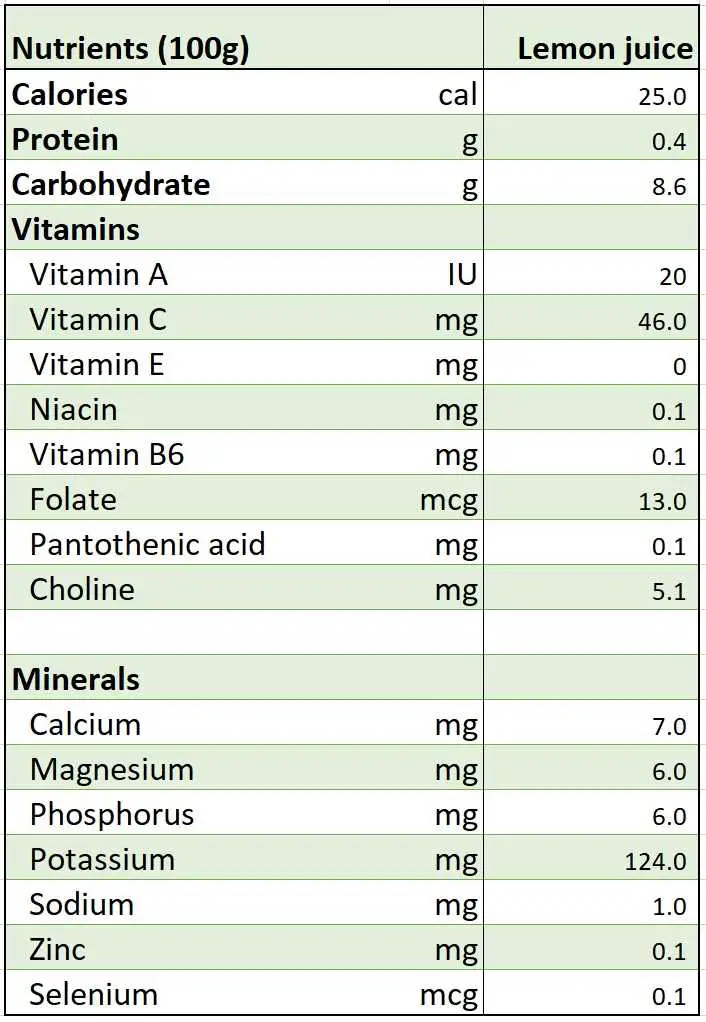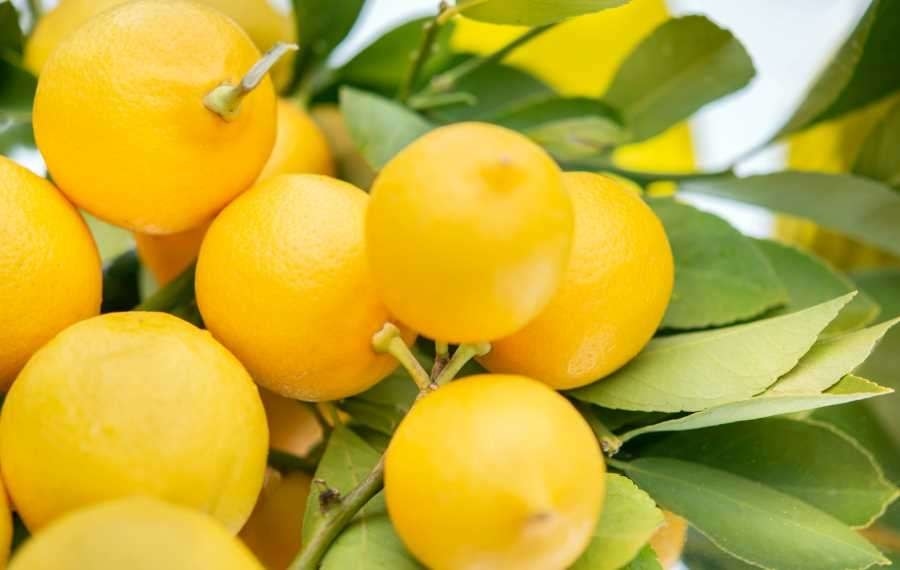Lemon juice is technically not carnivore but is it still okay to add to your meat-based diet?
Lemon juice is okay to add to the carnivore diet because it helps meet vitamin C requirements for those who don’t eat organ meat and don’t eat raw meat or lightly cooked meat. However, due to its acidity, lemon juice should be consumed occasionally in small quantities to avoid tooth erosion.
The remainder of the post looks at what’s in lemon juice, why it is okay on the carnivore diet, why it should be consumed in moderation only, its potential use during a water fast, and who should avoid lemon juice.
Lemon juice’s nutrition
As can be seen in the table below, lemon juice is very low in sugar, fat, and proteins. It is, however, rich in vitamin C and has a very small amount of other vitamins and minerals such as folate, vitamin B6, thiamine, potassium, magnesium, calcium, and phosphorus.[1]

Is lemon juice okay on the carnivore diet?
It is okay to have lemon juice on the carnivore diet because it helps meet vitamin C requirements for those who don’t eat organ meat and don’t eat raw meat or lightly cooked meat. However, due to its acidity, lemon juice should be consumed occasionally in small quantities to avoid tooth erosion.
1.Lemon juice helps meet vitamin C requirement
Lemon juice is rich in vitamin C and can help those who don’t eat organ meat or raw or lightly cooked meat often to meet their vitamin C requirement.
Vitamin C plays a very important role in the human body. It is required for the synthesis of collagen, the most abundant protein in the human body that can be found in blood vessels, skin, connective tissues, bones, and muscles. It is also required in the synthesis of neurotransmitters such as dopamine, norepinephrine, and epinephrine, as well as L-carnitine.[2]
Vitamin C is considered essential because your body can’t make it and must get it from dietary sources.
The current daily allowances of vitamin C recommended by the Institute of Medicine are 90 mg for males and 75 mg for females.[3]
Because on the carnivore diet, there is a very little amount of carbohydrates to compete with vitamin C for absorption, you don’t need as much vitamin C as you would if you are on a high-carbohydrate diet. Scurvy is unheard of in many societies subsisted on a heavily meat-based diet. [4]
As discussed in detail in this post, if you eat lightly cooked meat and incorporate organ meat on your carnivore diet, you will have no problem meeting the 10mg of vitamin C a day to prevent scurvy.
However, because vitamin C can be easily destroyed by heat, if you don’t incorporate organ meat (which has a decent amount of vitamin C) and prefer to eat everything well-cooked, there is very little vitamin C left in your meals.
Although vitamin C deficiency and scurvy are rarely reported amongst carnivore communities, if you prefer to be on the safe side and have no problem with eating a bit of fruit, it’s definitely fine to add some lemon juice to your meat or fish or to your drinks for flavor.
A lemon has about 20 mg to 30 mg of vitamin C, so you will need just half a lemon to meet the vitamin C requirement on the carnivore diet.
There are trace amounts of other nutrients in lemon juice but, apart from vitamin C, you really don’t need to drink lemon juice for these nutrients. Animal food is very nutrient-dense and you should be able to get sufficient nutrients from animal food.
2. Lemon juice should be consumed in moderation only to avoid tooth erosion
Lemon juice is highly acidic and should be consumed in moderation occasionally to avoid tooth erosion.
Lemon juice is low in calories and many people drink lemon juice believing that it can help them lose weight. However, there is absolutely no evidence to support this theory. If you are looking for ways to lose some excess fat, the carnivore diet is probably the best diet out there for healthy weight loss.
Furthermore, lemon juice is naturally acidic and drinking it too much and too often will cause tooth erosion.
A study in 2015 looked at the loss of enamel and dentin after exposure to different non-alcoholic drinks including Coca-Cola, Coca-Cola light, Sprite, apple juice, Red Bull, orange juice, Bonaqua Fruits (Mango-Acai), tap water, chlorinated swimming pool water, and lemon juice.[5]
It was found that lemon juice showed statistically significant higher erosivity than all other drinks while Cola and Cola light showed the least erosivity.
A case study also reported a woman in her 30s who had a severe erosion of the enamel, dentinal hypersensitivity, and excessive pigmentation of eroded areas due to excessive consumption of lemon juice for about one year. She drank lemon juice with water in the morning, had it at lunch and dinner and during snacks, used lemon and vinegar juice on salads and fruits, and drank lemon juice frequently after meals.[6]
In summary, if you are concerned about your vitamin C intake on the carnivore diet, drink a small quantity of lemon juice on occasions to protect your dental health.
If you have a lemon tree in the backyard or enjoy drinking it regularly, use a straw to protect your teeth.
Is lime juice okay on the carnivore diet?
Limes are similar to lemons. They are low in calories, rich in vitamin C, and have a trace amount of many vitamins and minerals. Limes’ vitamin C content is less than that of lemons, however.[7]
There was also a published case of a woman in her late forty whose inappropriate use of lime juice to lose weight had resulted in extensive dental erosion.[8]
The same rules should apply to limes: consume them occasionally and in moderation only due to their high acidity nature.
Is lemon juice okay during a water fast?
Lemon juice might be useful during a water fast because it has a small amount of electrolytes like calcium, potassium, phosphorus and magnesium.
If you add a bit of salt to the lemon juice, you’ll have a natural electrolyte drink that contains all six electrolytes: sodium, calcium, potassium, chloride, phosphate, and magnesium.
Because it has so few calories, lemon juice won’t break your fast.
I’ve found that lemon juice with a bit of sea salt makes water fast a little easier.
If you do a prolonged fast and drink lemon juice regularly, definitely use a straw to protect your teeth.
Who should avoid lemon juice?
There are rare cases of people who show immunologic reactions to citrus fruit compounds (lipid transfer proteins, profilin, and pectin).[9, 10, 11]
There was also a rare case of a 4-year-old boy who developed a severe anaphylactic reaction shortly after drinking a fresh homemade juice of carrot and lemon. Fifteen minutes after drinking the juice, he had nausea with intense abdominal pain, an asthma exacerbation with wheezing, followed by repeated vomiting and, one hour later, hives. [12]
He was presented to the emergency department and fully recovered after treatments. Test results showed carrot was not the problem but lemon seeds were.
Serious cases like this are rare, however, in many cases, the dose makes the poison. Plants certainly don’t want to be eaten. Even though lemons and limes aren’t known to contain troublesome antinutrients, it could be that we haven’t discovered them yet. Eating a lot of plant food, even the seemingly harmless ones, is not a good idea.
If you’re allergic to other citrus fruits like mandarin, orange or grapefruit, it might not be a good idea to consume lemons.
Lemons and other citrus fruits like orange, grapefruit, lime, and tangerine are also high in tyramine which is known to trigger migraines. If you have migraines, it’s best to avoid lemons.[13, 14]
If you have leaky gut syndromes or autoimmune diseases and are starting the carnivore diet hoping to fix these conditions, it’s best to avoid all plant food until these health problems are resolved. After that, you may reintroduce plant food one by one and see which one you can tolerate and is okay to be added back to your diet.
If you find this post helpful, please consider sharing this post and my site with your family, friends, and followers. That would be much appreciated. Please also check out my library of articles on the carnivore diet here which is updated regularly.
Disclaimer: The information in this post is for reference purposes only and not intended to constitute or replace professional medical advice. Please consult a qualified medical professional before making any changes to your diet or lifestyle.
Photo credit: Cristina Anne Costello on Unsplash

